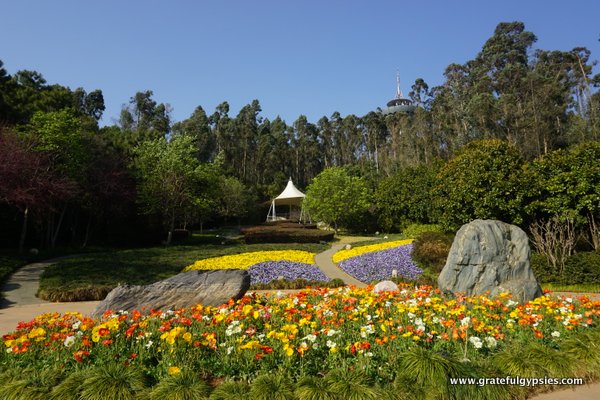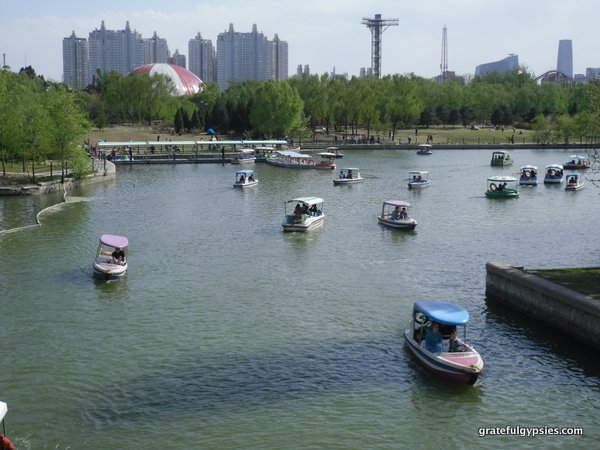Springtime in China Posted by sasha on Apr 12, 2018 in Vocabulary
Spring is finally here, and the weather is getting warmer and warmer across China. Winters can be long and harsh in many parts of the country, so the coming of spring is very welcome in places such as the northeast of China. In this post we’ll take a look at springtime in China, as we learn some spring-related vocabulary, find out what holidays are celebrated in this season, and take a look at some popular activities.
Spring Vocabulary
In Chinese, there are two different words you can use for spring – 春天 (chūn tiān) or 春季 (chūn jì). The weather in spring is warm (暖和 – nuǎn huo) and comfortable (舒服 – shū fú) for the most part. However, there’s also quite a bit of rain (雨 – yǔ) in many parts of the country during the spring months. Spring is also the time of year when much of northern China is hit by the “yellow sand” (黄沙 – huáng shā) storms.
The sand comes from the desert in northern China, Mongolia, and Kazakhstan, and powerful winds blow it eastward. It gets pretty bad in some parts of China, and the dust can cause serious health problems. As such, people in these areas will spend less time outdoors during the worst of the yellow sand storms.
While the sand storms are definitely a bummer, springtime isn’t all bad in China. Flowers are in bloom (鲜花盛开 – xiān huā shèng kāi), including the famous cherry blossom (樱花 – yīng huā) in some parts of the country. As such, visiting gardens (花园 – huā yuán) is a very popular springtime activity. We’ve introduced a few great Chinese gardens here on the blog over the years, including the Beijing Botanical Gardens and Kunming World Horti-Expo Gardens.
Just like in many places around the world, many people in China like to do a bit of spring cleaning (春季大扫除 – chūn jì dà sǎo chú) when the new season arrives. Students in China don’t really get a spring break (春假 – chūn jià) like they do in the US, but there are a few national holidays during the spring months where everyone gets a short break.
Holidays
There are a trio of Chinese holidays that happen in spring – Tomb Sweeping Festival (清明节 – qīng míng jié), Labor Day (劳动节 – láo dòng jié) and Dragon Boat Festival (端午节 – duān wǔ jié). People will usually enjoy a 3-day holiday during each of these. Labor Day used to be another “Golden Week” in China just like Spring Festival and National Day, but it was shortened in favor of having more, shorter holidays rather than a few long ones.
Young people get a few extra holidays during the spring months in China. On Youth Day (青年日 – qīng nián rì), young people over 14 get a half-day off of school, while those under 13 get a whole day off for Children’s Day (儿童节 – Ér tóng jié).
Popular Activities
The winter months can be quite brutal in many parts of China. When the warmth of spring finally melts the ice of winter, people love getting outside. Local parks (公园 – gōng yuán) are always full of people during the spring months. Amusement parks (游乐园 – yóu lè yuán) that are closed for the winter finally reopen. After spending much of the winter indoors bundled up, everyone is happy to get back outside.
Springtime in China is perfect for hiking (徒步旅行 – tú bù lǚ xíng). Even in big cities like Beijing, you’ve got plenty of options to get out there and walk in the hills. Check out 5 awesome Beijing day trips for a few ideas. When I lived in Beijing, I always looked forward to hiking on the weekends during spring. Winters are so tough there and it can be miserably hot in summer, so spring is the perfect time to enjoy the great outdoors.
So what do you think about spring? Try answering these questions in Chinese by leaving a comment below:
你喜欢春天吗? 为什么?
nǐ xǐ huān chūn tiān ma? wèi shén me
Do you like spring? Why?
春天的时候,你喜欢做什么?
chūn tiān de shí hòu, nǐ xǐ huān zuò shén me
What do you like to do in spring?

Build vocabulary, practice pronunciation, and more with Transparent Language Online. Available anytime, anywhere, on any device.








Leave a comment: